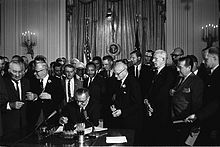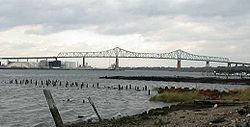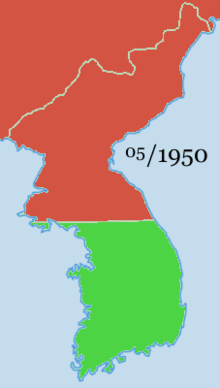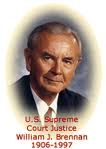This is your morning Open Thread. Pour your favorite beverage and review the past and comment on the future.
Find the past “On This Day in History” here.
Click on images to enlarge.
July 2 is the 183rd day of the year (184th in leap years) in the Gregorian calendar. There are 182 days remaining until the end of the year.
It is the midpoint of a common year. This is because there are 182 days before and 182 days after (median of the year) in common years, and 183 before and 182 after in leap years. The exact time in the middle of the year is at noon, or 12:00. In the UK and other countries that use “Summer Time” the actual exact time of the mid point in a common year is at (1.00 pm) 13:00 this is when 182 days and 12 hours have elapsed and there are 182 days and 12 hours remaining. This is due to Summer Time having advanced the time by one hour. It falls on the same day of the week as New Year’s Day in common years.
On this day in 1964, U.S. President Lyndon B. Johnson signs into law the historic Civil Rights Act in a nationally televised ceremony at the White House.
In the landmark 1954 case Brown v. Board of Education, the U.S. Supreme Court ruled that racial segregation in schools was unconstitutional. The 10 years that followed saw great strides for the African-American civil rights movement, as non-violent demonstrations won thousands of supporters to the cause. Memorable landmarks in the struggle included the Montgomery bus boycott in 1955–sparked by the refusal of Alabama resident Rosa Parks to give up her seat on a city bus to a white woman–and Martin Luther King, Jr.’s famous “I have a dream” speech at a rally of hundreds of thousands in Washington, D.C., in 1963.
The Civil Rights Act of 1964 (Pub.L. 88-352, 78 Stat. 241, enacted July 2, 1964) was a landmark piece of legislation in the United States that outlawed major forms of discrimination against blacks and women, including racial segregation. It ended unequal application of voter registration requirements and racial segregation in schools, at the workplace and by facilities that served the general public (“public accommodations”). Powers given to enforce the act were initially weak, but were supplemented during later years. Congress asserted its authority to legislate under several different parts of the United States Constitution, principally its power to regulate interstate commerce under Article One (section 8), its duty to guarantee all citizens equal protection of the laws under the Fourteenth Amendment and its duty to protect voting rights under the Fifteenth Amendment.



 On this day in 1986, the
On this day in 1986, the 

 On this day in 1919,
On this day in 1919, 



 On this day in 1957, the U.S. Supreme Court rules that obscenity is not protected by the First Amendment.
On this day in 1957, the U.S. Supreme Court rules that obscenity is not protected by the First Amendment.
Recent Comments